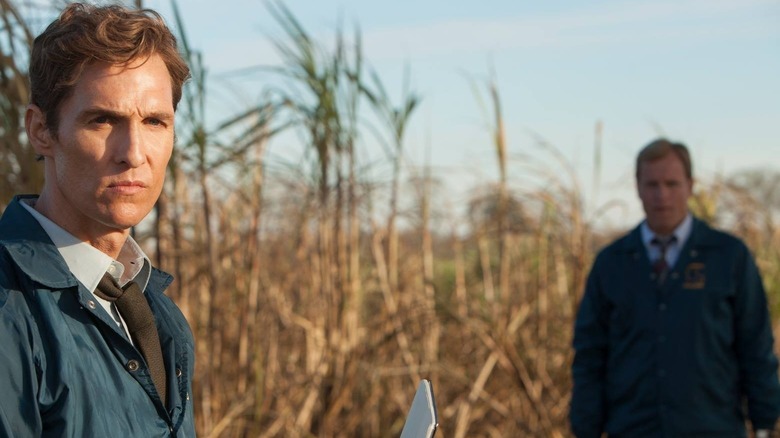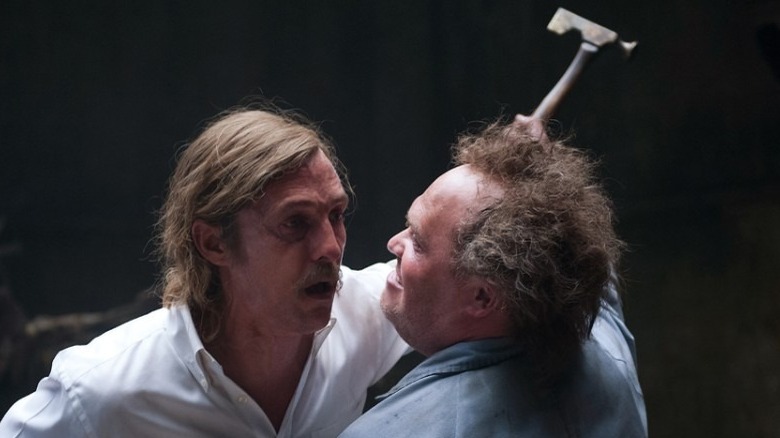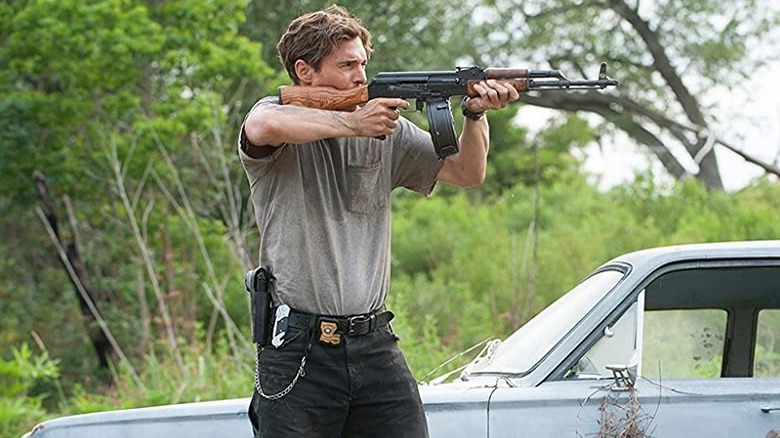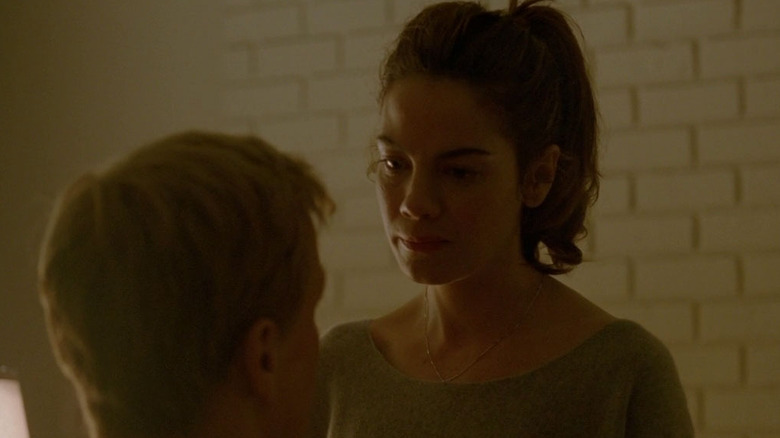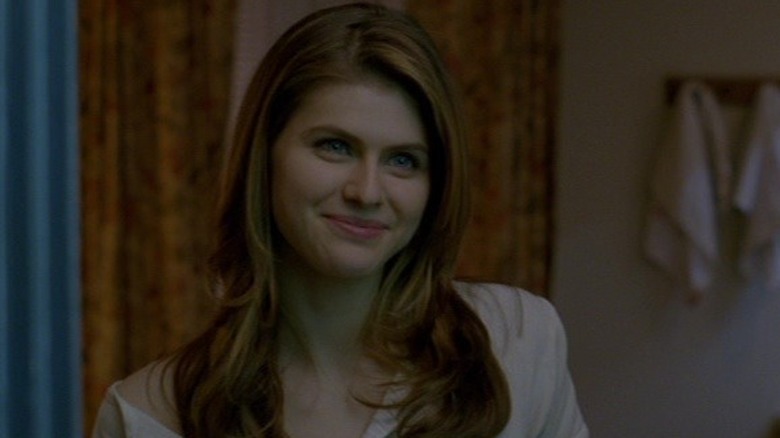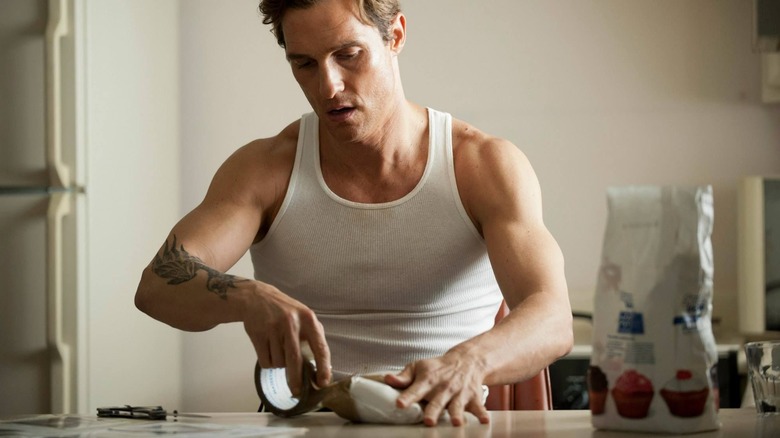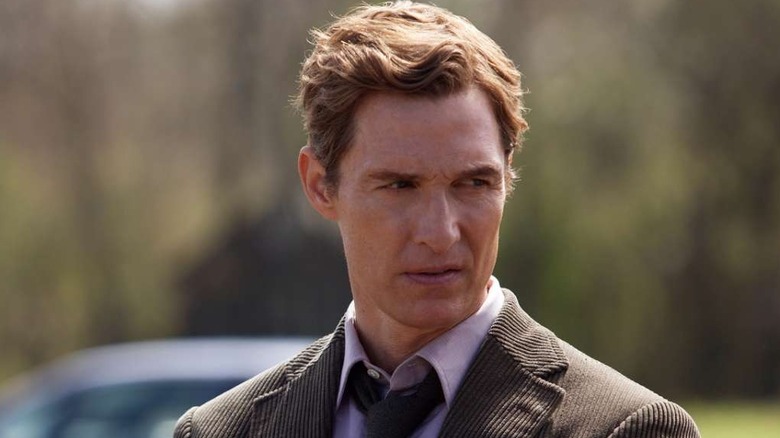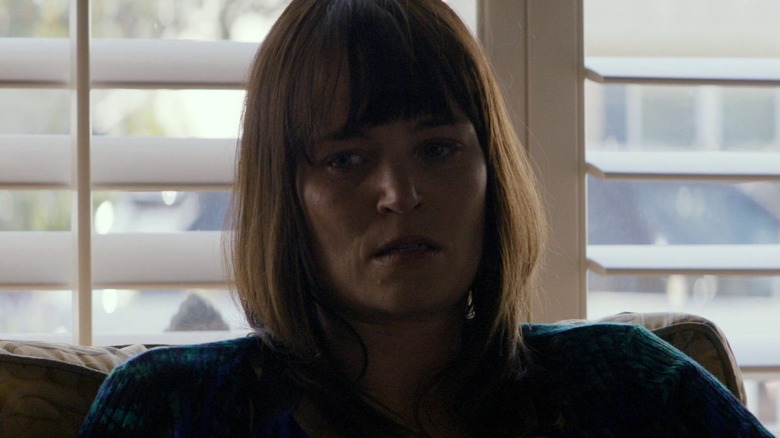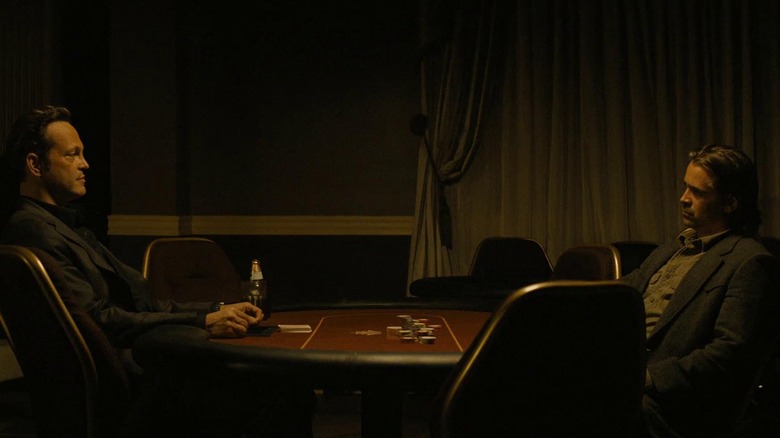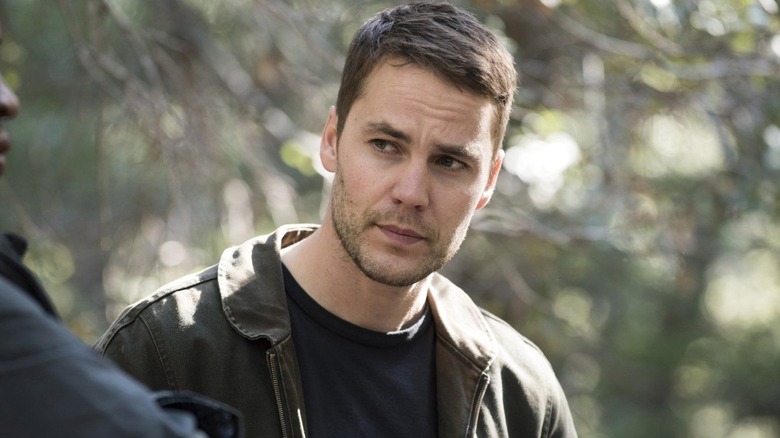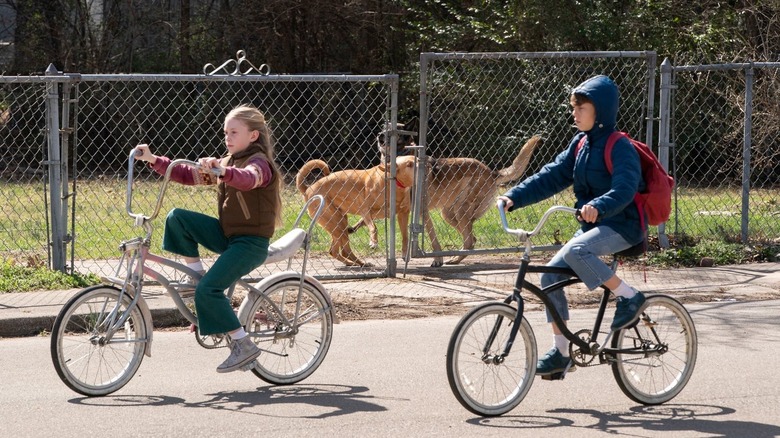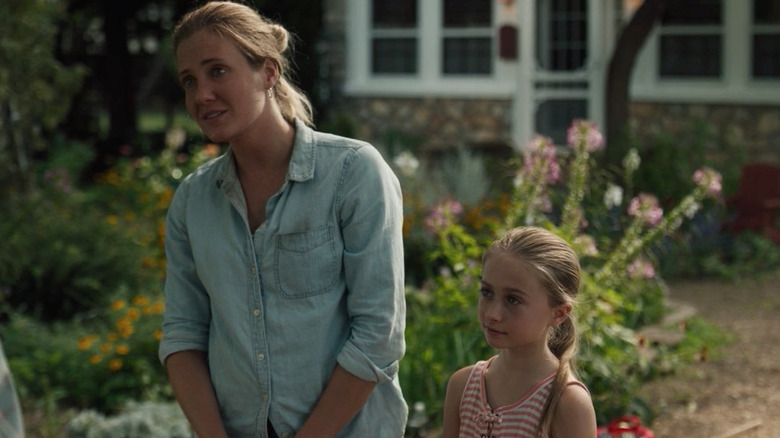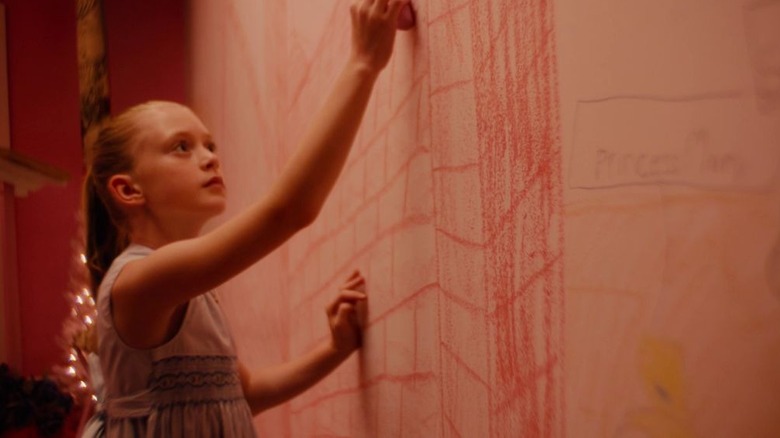Questionable Things We Ignore In True Detective
When fans first started flocking in to watch "True Detective," one thing was immediately clear. Nic Pizzolatto had crafted a fresh model for the anthology procedural by asking one simple question: What if it took an entire season to solve one case?
Season 1 took full advantage of the McConaissance era by having Matthew McConaughey play Detective Rust opposite Woody Harrelson's Detective Hart. The pair played two hedonistic sleuths that struggle to get along as the case they're investigating drags on. Much of the conflict is derived from their anti-buddy cop chemistry, which oddly enough creates more chuckles than it has any right to, and the sinister atmosphere created by the Emmy winning direction of Cary Joji Fukunaga that perfectly explored the depths of darkness it takes to solve a truly sadistic murder case.
The following seasons followed the same formula of cops with a dark past forming a mismatched partnership and taking an entire season down a rabbit hole to solve a sick crime. However, despite the winding mysteries and great casts in every season, aspects of the series should still be subject to scrutiny. Here are some questionable things in "True Detective."
Detective Rust employs police brutality in his investigation.
One of the most distinctive elements of "True Detective" is its multiple timelines. In Season 1, Detective Rustin "Rust" Cohle (Matthew McConaughey) gives several interviews in the future timeline about events that went on during and before the investigations that made him as dark and obnoxious as he usually was. Most of his trauma was understandable, especially considering what he went through as an undercover narcotics agent. However, it's pretty striking to see Detective Rust confess to having physically attacked a witness for information and even killing a suspect in a prior investigation.
In the future timeline, it's visible that Detective Rust has fallen from grace and is even the central suspect of the initial murder. Because of this, it's possible that his conduct led the police department to turn on him eventually. Even if that is the case, it's quite concerning that all his other crimes just get swept under the rug, considering they take the murder of Dora Lange with the seriousness it deserves. Furthermore, if the main goal is to finally pin down Detective Rust with a criminal case, then why aren't the confessions of his killing and utilizing police brutality in his investigations enough evidence to prosecute him?
Crude reinforcement of Southern cliches
"True Detective" was often critically praised for using the ominous tone created by the American countryside setting in Season 1. This approach to determining the setting was inspired by other HBO classics like "Deadwood." The simple approach made a creepy outlook that the season desperately needed. In fact, the remote setting of Louisiana was so critical to the story that when the second season moved to the metropolitan area of Los Angeles, fans and critics were taken aback.
Notwithstanding the mise en scene, oftentimes the depictions of Southerners descended into parody. Many of the characters being interviewed by the two detectives either practiced voodoo or had an incestuous relationship, sharing portrayals of stereotypical "hillbillies" with not much complexity. It's especially underwhelming considering the show has an otherwise very layered study of both leading detectives, with each of them having to balance their evil and righteousness.
The portrayal of women is paper-thin
Season 2 of "True Detective" gave us a female lead played by Rachel McAdams, but this casting only makes the aging of Season 1 all the more ghastly when it comes to how the female characters were portrayed. In Season 1, all the women are either the nagging spouse, the prostitute, or the murder victim. Beyond those shallow characterizations, nothing else distinguishes them from each other.
Season 1 is entirely based on the perspective of Detective Rust and Detective Hart in their quest to find justice for a murdered prostitute. It is quite plausible that how the women are depicted in the show is an artistic choice to show the audience what the detectives' perceptions of women were. Detective Rust was trying to redeem himself after losing his daughter, which led to the divorce between him and his ex-wife, and Detective Hart was trying to justify how he still cares for women despite his affairs. So it is quite interesting to be shown their inherent hypocrisy of trying to help women while thinking so little of them.
However, what it comes down to is if at any point any female character challenged their male leads with a bit more depth and, by extension, the audience. The answer to that query is no. The season, therefore, ends up positing that women are simplistic.
There was no logical reason for Detective Hart to tell the interviewers that he was having an affair
In the first episode of "True Detective," Detective Hart sits in the current timeline and remarks to the detectives interviewing him that a man without a family is a bad thing past a certain age. He then stares at his ring finger, that's noticeably jewelry free. He, of course, was talking about Detective Rust being unmarried when they first became partners. This further highlights Hart's struggle with the inability to have any meaningful self-awareness.
As the interview goes on, Hart inexplicably starts talking about how he used to have affairs with his mistress Lisa (Alexandra Daddario) behind his wife's back. Sometimes this came off as beneficial information, explaining why he had an altercation with Detective Rust in the police locker room. However, sometimes he would tell the police interviewing him about spats he had with Lisa that seemingly had no connection with the main investigation. Sure, he could be rambling because he pent all these things up and finally had an outlet to release it all, but it seems like a contrived explanation.
Hard drugs seemingly do not affect Detective Rust
At one point during the interviews, Detective Rust goes into a very dark story about how the death of his daughter and divorce led him into a dark path of several years as an undercover narcotics agent and how that led him to use various cocktails not only to fit in but to also stay sane during this period. Detective Rust says this as he hammers down a six-pack of beer and chain-smoking cigarettes, so it's well established that he built quite a tolerance for drugs.
In an earlier timeline, when Detective Hart's wife, Maggie (Michelle Monaghan), invited Detective Rust over for dinner, he arrives intoxicated and angers Hart. They then hatch up a plan on how he can excuse himself under a pretense created by Hart. However, the dinner goes on well with little to no issues. Later on, he's then shown doing drugs, leading to vivid hallucinations while driving and even with Detective Hart. However, he never mentions them, and Hart never notices.
This lack of acknowledgment suggests that the many drugs taken by Detective Rust cause him no intoxication whatsoever. He can still make good decisions, drive, and have his memory, and it's barely noticeable to the people around him.
If you or anyone you know is struggling with addiction issues, help is available. Visit the Substance Abuse and Mental Health Services Administration website or contact SAMHSA's National Helpline at 1-800-662-HELP (4357).
Detective Rust reveals that he lost his child twice
When Detective Rust first meets Maggie at their family dinner, her kids ask him whether he's ever had to shoot someone or if he has been as fortunate as their father, Detective Hart. He then tells the children that he has not been as lucky and has had to shoot people before. He then mentions that even though he doesn't have a family now, he used to have a wife and daughter. Sadly, his daughter died at some time.
Later on, in the show, when the two detectives have their usual philosophical debates as they drive around Louisiana following clues, Detective Rust tells Detective Hart that he had lost his daughter and Hart is pretty surprised. This reaction is presumably owing to the fact that when Rust first shared the information with his wife, Hart wasn't in the room at the time, and he didn't hear him say this particular story.
However, it's pretty unlikely that Maggie didn't later tell him that Rust had lost his daughter or at least mention it to him in some way offscreen. Another unlikely explanation is that Hart knows about it when Rust says it and is just being respectfully empathetic. It may seem pedantic at first, but with the many cases of Pizzolatto's overwriting, this mistake seems an exemplar.
Stan's death was not set up
In Season 2, "True Detective" traded the remote countryside setting of Louisiana for sunny Los Angeles to show the complexity of corruption and just how deep it goes and affects everyone it touches. It was initially received negatively owing to the inevitable comparisons to the first season, the complex storyline, and the bloated list of characters.
One such character was Stan (Ronnie Gene Blevins), whose main arc was getting too invested in Blake (Christopher James Baker) and his schemes leading to his untimely death. Unfortunately, not too much time was spent developing his character to the point that when he does die, the wonder is not even why should I care about this but rather who is this Stan.
When the death does occur, they show his widowed family grieving. What is immediately apparent is that Pizzolatto even spent more screen time showing his grieving family than Stan himself. It's a very forgettable end to an even more forgettable character.
The occult from Season 1 randomly gets referenced in Season 2 and then just gets ignored
Season 2 started with a noticeable handicap considering the first season was such a cultural juggernaut with the ratings and award recognition to boot. Obviously, that builds expectations. That coupled with the fact that Nic Pizzolatto had more time to work on the first season, there arose a situation where the only way he could appeal to the initial fans with something so fresh and novel was to give them slight nods and easter eggs.
However, the problem with this is that such nods create expectations, especially in a world where pop culture is oversaturated with various multiverses. The first episode of "True Detective" Season 2 introduced us to multiple instances of imagery that suggests the existence of the occult from Season 1, from the strange bird heads to creepy drug retreats that were all eventually abandoned by the climax of the show.
Red herrings are always fascinating in shows that deal with investigations because part of the fun of the narrative is figuring out who did it before the show finally reveals it at the end. However, it starts to feel unearned when the entire purpose is to feed off the audience's nostalgia, even if it's completely irrelevant.
Paul Woodrugh became an overnight celebrity but was immediately able to just go unnoticed
Paul Woodrugh (Taylor Kitsch) rises to infamy with the LA media during his stint as a motorcycle cop on highway patrol when he sees star Lacey Lindel (Ashley Hinshaw) veering off the road, clearly intoxicated. She then tried to bribe him with a blow job, resulting in Woodrugh being accused of sexual misconduct. Because Lindel is a celebrity, the whole case causes a media circus all around Woodrugh, and news reporters and their cameras constantly mob him.
This all sounds plausible but where the story starts becoming suspicious is despite his co-workers constantly teasing him about his own celebrity, whenever the plot requires him to conduct his investigations without much interruption, suddenly nobody can recognize him as the celebrity he has already been established to be.
It's not the only instance where a character can step in and out of the limelight in the oftentimes bizarrely undercooked second season of "True Detective" but it is by far the most glaring one. Inconsistencies can sometimes pull an audience member out of an otherwise good show.
The detectives couldn't tell Lucy looked like a younger Julie
"True Detective" Season 3 was considered by many fans as a return to form. What also made a comeback was the utilization of multiple timelines, with there being three timelines instead of two. Another difference was that this time, the crime was not a murder case but rather the case of two missing children. The location also shifted from L.A. to the Ozarks.
Detective Hays (Mahershala Ali) and Detective West (Stephen Dorff) conduct a 25-year-long investigation with plenty of false finishes. When they finally solve the case, however, they find out that the two missing children were involved in a murder-kidnapping orchestrated by Isabel Hoyt. This plot began after Hoyt started growing mentally unstable after losing her husband and child.
Hays and West find out that Julie was kidnapped by Isabel Hoyt and eventually was able to escape and died of HIV after being taken in by the convent. However, after Hays goes home and finally reads the book of his late wife, Amelia Reardon (Carmen Ejogo), he realizes that Julie is still alive and the convent faked her death to protect her.
The only problem with this path is that it's mentioned many times that Julie's daughter Lucy looks a lot like a younger Julie. The detectives even previously investigated the case and scrutinized the pictures of a young Julie, meaning they would have been the first ones to notice the resemblance.
Julie named her daughter after her mom Lucy while trying to keep a low profile
Julie met her old classmate Mike Ardoin (Corbin Pitts), who was the groundskeeper's son in the convent. They agreed to keep her actual identity a secret to protect their new family from people who were willing to go through drastic steps to hide their deeds from seeing the light of day.
Later on, Julie and Mike had a daughter, naming her Lucy after Julie's mother. This raises confusion considering Julie wanted to keep a low profile after escaping. The convent also went through the trouble of faking her death and creating a new identity for her.
This would be considered especially careless, considering Julie knew she was constantly being searched for throughout those years. She wasn't trusting anyone's motives after what she went through and the PTSD she undoubtedly still has. It is possible, however, that she still wanted to honor the family that raised her, but if that was the case, then it's also unlikely that she wouldn't also contact her actual mother, Lucy (Mamie Gummer) at any point in time.
Julie didn't contact anyone after Will accidentally died.
When Julie was a child, she and her brother Will used to play with Isabel Hoyt to cheer her up from the tragedy she experienced in her own life. The arrangement was made after Isabel likened Julie to her daughter when she saw her play during the Hoyt picnic, and she agreed to part with a fee for the chance to host Julie. Lucy agreed, as long she's always accompanied by her brother Will.
Trouble arose when Isabel accidentally killed Will, and the only way they could cover up the crime was to abduct Julie and frame someone else to have kidnapped both children. She then drugged Julie with lithium to cause confusion and distrust toward her memory.
But there are many instances where an older Julie could have contacted the police to inform them that Will had died. There's no logical reason for her never to consider doing this.
